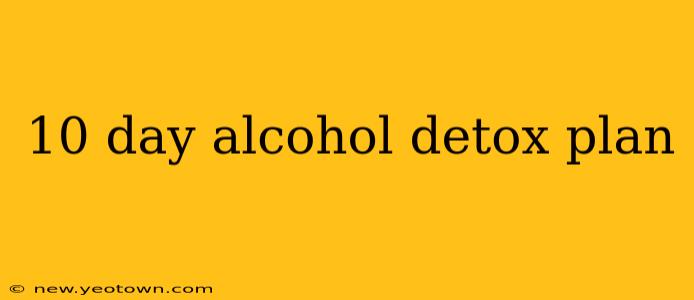10-Day Alcohol Detox Plan: A Journey to Sobriety
Embarking on an alcohol detox journey is a significant step, and it's crucial to understand that this isn't a race, but a marathon requiring careful planning and support. This 10-day alcohol detox plan serves as a guide, not a substitute for professional medical advice. Always consult your doctor or a healthcare professional before attempting any detox plan, especially if you have a history of alcohol dependence. They can assess your specific needs and help you create a safe and effective plan. My intention here is to provide information and support, not to offer medical guidance.
This plan emphasizes a holistic approach, focusing on physical and mental well-being throughout the detox process. Remember, everyone's experience is unique, and you may need to adjust the plan based on your individual needs and progress.
Phase 1: Preparation (Days 1-2)
This initial phase is about setting the stage for success. It’s not about immediate abstinence, but about creating a supportive environment and preparing your body for the changes ahead.
- Consult your doctor: This is paramount. They can help determine the safest approach and identify any potential complications. They may also recommend medication to manage withdrawal symptoms.
- Create a supportive environment: Inform your loved ones about your plan and enlist their support. A clean and comfortable space free from alcohol triggers is essential.
- Stock up on healthy foods: Fill your fridge with fruits, vegetables, lean proteins, and whole grains. These provide essential nutrients crucial for recovery.
- Prepare for withdrawal: Understand that withdrawal symptoms can range from mild to severe, including anxiety, tremors, nausea, headaches, and insomnia. Prepare for these by creating a comfortable, quiet space, and having over-the-counter pain relievers (always consult your doctor before taking any medication).
- Start journaling: Document your feelings, thoughts, and experiences. This can be a powerful tool for self-reflection and monitoring your progress.
Phase 2: Detoxification (Days 3-7)
This is the core of your detox plan. The goal is to gradually reduce or eliminate alcohol consumption under medical supervision.
- Gradual reduction (if medically advised): Your doctor might recommend a gradual reduction in alcohol consumption rather than abrupt cessation, especially if you have a history of heavy drinking. This minimizes the risk of severe withdrawal symptoms.
- Hydration is key: Drink plenty of water, herbal teas, and electrolyte drinks to flush out toxins and stay hydrated. Dehydration exacerbates withdrawal symptoms.
- Nourishing your body: Eat regular, healthy meals to provide essential nutrients and energy. Avoid processed foods, sugary drinks, and caffeine.
- Rest and relaxation: Get plenty of sleep. Rest is crucial for recovery and managing withdrawal symptoms. Practice relaxation techniques like deep breathing or meditation.
- Manage withdrawal symptoms: Use prescribed medications as directed by your doctor to manage withdrawal symptoms. Never attempt to self-medicate.
Phase 3: Recovery and Stabilization (Days 8-10)
This phase focuses on stabilizing your body and preparing for long-term sobriety.
- Continued healthy habits: Maintain the healthy eating and sleeping habits you’ve established.
- Professional support: Consider attending support groups like Alcoholics Anonymous (AA) or seeking therapy to address the underlying causes of your alcohol use.
- Focus on mental well-being: Engage in activities that promote mental well-being, such as exercise, meditation, yoga, or spending time in nature.
- Plan for long-term sobriety: Develop a plan for maintaining sobriety beyond the 10-day detox. This might include ongoing therapy, support groups, or lifestyle changes.
What are the potential dangers of alcohol withdrawal?
Alcohol withdrawal can be dangerous, even life-threatening in severe cases. Symptoms can range from mild (anxiety, insomnia, tremors) to severe (seizures, hallucinations, delirium tremens). The severity of withdrawal depends on factors like the amount and duration of alcohol consumption. Never attempt a detox without medical supervision, especially if you have a history of heavy drinking.
How long does it take to detox from alcohol?
The duration of alcohol detox varies greatly depending on individual factors like the amount and duration of alcohol use, overall health, and the presence of any co-occurring conditions. While some individuals might experience the worst of withdrawal symptoms within a few days, others may require weeks or even months for complete detoxification and stabilization.
What are the signs and symptoms of alcohol withdrawal?
Signs and symptoms of alcohol withdrawal can include anxiety, irritability, insomnia, tremors, sweating, nausea, vomiting, headaches, seizures, hallucinations, and delirium tremens (DTs), a severe and potentially life-threatening condition characterized by confusion, disorientation, and hallucinations.
What are the long-term effects of alcohol withdrawal?
While many people fully recover from alcohol withdrawal, some may experience long-term effects like post-acute withdrawal syndrome (PAWS), characterized by lingering symptoms like anxiety, depression, mood swings, and sleep disturbances. Proper medical care and support are vital for managing these potential long-term effects.
This 10-day alcohol detox plan is a starting point. Your journey to sobriety is personal and requires professional guidance. Remember to prioritize your health and well-being, and seek support throughout the process. You are not alone.

